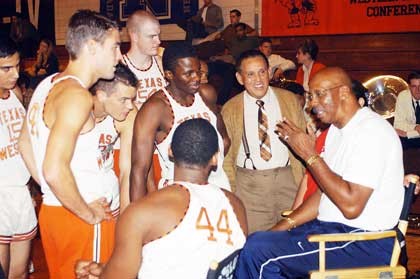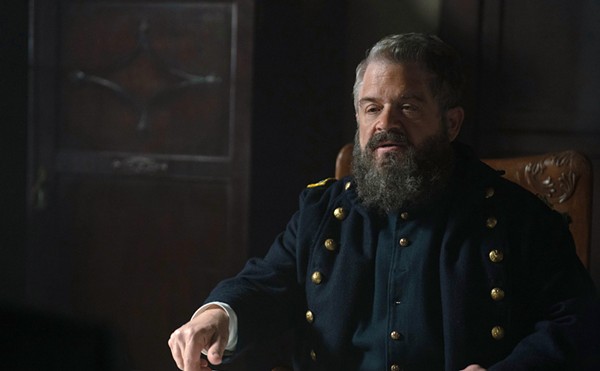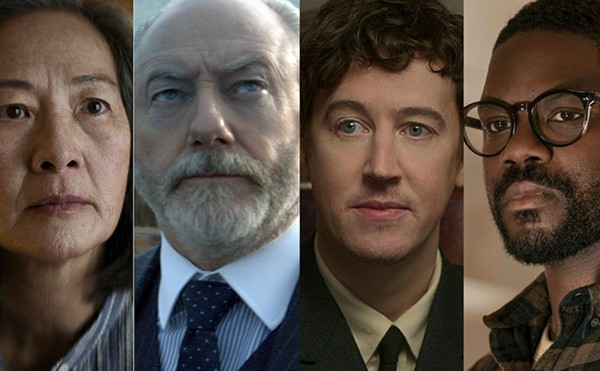Former Miner Nevil Shed says Bruckheimer’s film is more truth than fiction
Nevil Shed’s telephone is ringing. Again.
Context: In 1966, the Texas Western University Miners stormed through a 27-1 season to unseat the granddaddy of all basketball Goliaths, Adolph Rupp’s Kentucky Wildcats. The ’66 Miners, under Hall of Fame coach Don Haskins, was the first team in history to feature an all-black starting lineup in an NCAA championship game — and what’s more, they beat Rupp’s all-white one. The win for Texas Western (now UT-El Paso) decisively trumped the then-prevailing theory regarding basketball and race: Blacks, lacking in mental capacity and discipline, couldn’t compete with whites on the court.
| Former Texas Western University Miners player Nevil Shed, seated at right, with the cast on the set of Glory Road. |
Shed, now director of Student Programs at UTSA, was a starter on that Texas Western team. The surfeit of attention heaped on him recently is a result of Glory Road, the Disney/Jerry Bruckheimer collaboration that commits the Miners’ story to celluloid, 40 years after the fact.
As with most true-stories-turned-blockbusters, Shed acknowledges this one has been polished, but he says much of the touch-up work was done for illustration, and to lend historical perspective.
“The movie was perfectly made,” says Shed, all 6-8 of him tucked comfortably into a swivel chair in his office at the Roadrunner Roost, a UTSA student rec center. “The people who portrayed the athletes, they did a great job.”
Shed, who figures heavily in the film’s plot and gives Glory Road most of its memorable moments, is played by actor-comedian Al Shearer of How High and BET’s Hits from the Street.
“He said, ‘Mr. Shed! I’m you! You’re me!’” Shed says, recalling his first meeting with Shearer. “And I said ‘I’m me! We I’m you!’ And we embraced, and a fabulous relationship happened, right there. And this guy, I knew — he was the one to play me.”
Glory Road goes like this: Haskins, a high-school girls’ basketball coach, jumps at the chance to coach men at a Division I college, and lands at the ailing Texas Western program. Realizing his pickings are slim, he begins wooing talented, unattached players from places such as New York. He takes heat from colleagues and supervisors for bringing in seven new black players, but presses on. Tension exists between the new Yankee black players and the now-displaced Southern white players, some of whom had never seen a black person. Tension eases when the players break Haskin’s conduct rules and attend a late-night party. The season begins, and the team starts winning. On a road trip, Shed is beaten in a racially motivated diner incident. Sometime afterward, the team returns to a hotel to find racial epithets scrawled in blood on the walls. Undefeated, they play Seattle, and lose, due to lack of teamwork brought on by resurgent racial tension. But tension turns to unified passion via a speech wherein Haskins fires up his players by telling them they’re not smart enough to compete with whites. They meet Rupp, rumored to be a racist, in the final, and beat his Wildcats for the title in a double-overtime thriller.
How does the film fare versus real life? (Note: Spoilers ahead.)
Truth: Haskins coached high-school girls’ and boys’ basketball before coming to the Miners. A scene in which Haskins, trying to motivate Shed, threatens to send him home, happened much how it is seen in the film. Haskins, incensed at Shed’s lack of rebounding intensity, entered the player’s room, flashed a ticket home, and began packing Shed’s belongings into a suitcase, with Shed unpacking and Haskins re-packing, until Shed finally broke down and said he wanted to stay. The next day, Shed played so hard against fellow Miner David Lattin that the former wound up with a broken nose. Undaunted, he slapped on a baseball catcher’s mask and came back out on the floor.
Shots of enormous, swirling Confederate flags in the stands during the final are exaggerated for impact, Shed says, but not necessarily untrue. “I saw some small ones,” he says.
Polish: Shed wasn’t really jumped in a diner. But, he stresses, he easily could have been, and similar things transpired in the South in those days. Nor did the Texas Western team find hate wallpaper in their hotel room, though Shed says he knew players to whom comparable things happened.
Shed says he and his African-American teammates never encountered significant racial tension in El Paso, or among their white counterparts. Some of the black guys had never played with white guys, and one or more of the white guys had never seen a black guy, but the reception in El Paso and on the team was “fantastic, just fantastic.”
Shed and company didn’t arrive at Texas Western at the same time, nor did Haskins win the championship in his first year. The film packs four years of recruiting and basketball into a single season.
And Haskins’ “not smart enough” delivered before announcing an all-black lineup as a statement to the nation? Hooey, Shed says.
“We had no idea that we were actually breaking the barrier,” Shed says. “Our thing was the jubilation of just winning the most prestigious event `in college basketball.` Later on we began to realize that we did something special.”
Haskins, played by Josh Lucas (Sweet Home Alabama, Stealth), was known for being a strict disciplinarian, which contributed greatly to his teams’ successes, but seem to have elicited mixed reactions from at least one of his players.
“God, I hated that man,” Shed says, (probably) joking. “Lord, I hated him in college. You know, just how hard he was, all that running and stuff. But you know, today, and for so, so many years after I played, I love him with all my heart. Because he cared about us.”
“I’m still his ballplayer,” he says. “I remember one time talking to `Lucas`, and he kind of positioned himself like Coach Haskins would do, and he kind of looked at me Coach had this, not an evil eye, but a tenacious eye, and I I thought I was going to have to get out there and start running wind-sprints or something.” •















